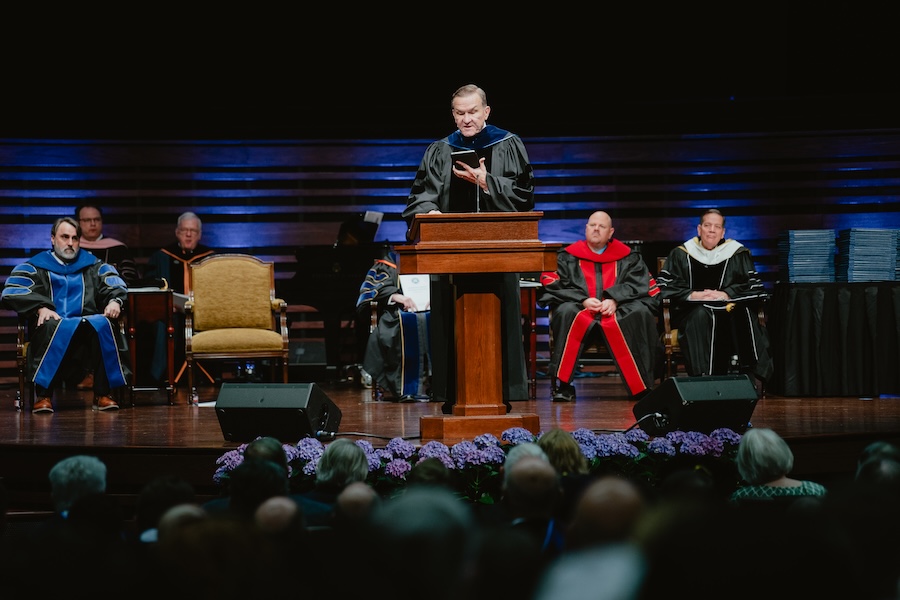Myers: Musical beauty ‘contains a summons’ to glorify God

Christians must resist the cultural temptation to see musical expression and practices as beyond Christian discipleship and must see the beauty of music ‘contains a summons’ to glorify God, author Ken Myers said in keynote talks for The Southwestern Baptist Theological Seminary’s School of Church Music and Worship, April 17.
Throughout the month of April, the School of Church Music and Worship has hosted scholarly presentations online through its “Artistic Theologian” website. In addition to paper presentations by faculty and students, these webinars featured two presentations by Myers, host and producer of the Mars Hill Audio Journal and author of such works as All God’s Children and Blue Suede Shoes: Christians and Popular Culture. Myers spoke on two topics: “Musical Discipleship in the Face of Moralistic Therapeutic Deism” and “Encountering the Really Real in Musical Beauty.”
Myers’ webinar was held as the school also launched new resources, including a revised website and a new issue of its academic journal. As explained in a campus-wide email, the website “has expanded to include resources that aid worship pastors and music ministers understand and implement local church worship that is biblically faithful, musically excellent, and ministry focused.” These resources include both scholarly lectures and articles as well as worship service orders, Scripture readings, prayers, songs, and more for local churches. To learn more, visit ArtisticTheologian.com.
During the webinar, Myers spoke to the fact that “the nature and the consumption of music today is generally assumed to be an expression of something that’s deeply personal, instinctive, and beyond thoughtful discipline, and Christians typically believe about music the same sorts of things that their neighbors believe.”
Noting the harmful effects this can have on worship, as well as discipleship overall, Myers said that Christians “can’t avoid addressing the ways in which the practices of music form our hearts, form our affections.”
“Disordered musical practices make us love things that we shouldn’t while depriving us of opportunities for delight in the best that music can be,” he said. “The unique nature of music enables it to shape our affections and dispositions with an unparalleled power. And as a result of that, philosophers and theologians and teachers long believed that the shaping of musical taste was a significant part—in fact, a foundational part—of moral formation.”
“But for a host of reasons,” Myers continued, “the mid-20th century witnessed a remarkable abandonment of that concern. So musical affections, musical preferences, are now typically regarded to be self-authenticating, and any effort to shape taste is regarded as woefully elitist.”
Myers exhorted Christians to not allow themselves to be overly influenced by the culture, but to see how their faith encompasses all of life.
“The church’s work of discipleship should challenge all of the ways in which the surrounding culture deters us from living a full and rich and loving and fulfilling life that we’re created to live,” Myers said. “And I believe that’s what a recognition of Christ’s lordship implies. Avoiding conformity to the world doesn’t mean that our lives are less human or less culturally rich. On the contrary, the transformation of our understanding of God and of His creation enables us to live much more fully human lives, lives that are in tune with the harmony of God’s good creation.”
In his second presentation, Myers addressed how the beauty of music “contains a summons.”
“It awakens awe in us,” he said. “It elevates us above that which is base. It fills our hearts with a longing for the eternal beauty of God.”
The beauty of music—as well as the beauty of love, truth, and goodness—are all a sign of the glory of God, he said.
“That’s why I think the church has almost always tried to make everything in its life beautiful—its buildings, its music, its furnishings, the clothes worn by its clergy, the flowers and the ways its altars are decorated. All of these things in their beauty are a shadow of the glory of God,” Myers said.
Myers exhorted Christians to keep beauty in their lives to remind them of God’s glory.
“And we need to respond and honor God’s glory, to worship Him,” he said, “so that we can take proper delight in who He is and in all of the things He has made.”
To view Myers’ and other webinar presentations, as well as a schedule for upcoming sessions, visit ArtisticTheologian.com/events.



